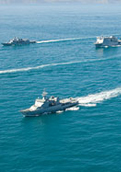Ministry of Defence 2026–27 Budget Estimates: An Analysis
The budget estimates (BE) for the Ministry of Defence stand at Rs 784,678.3 crore, an increase of Rs 103,468.03 crore (15.2 per cent) over 2025–26 BE.
- S. Samuel C. Rajiv, Abhay Kumar Singh |
- February 13, 2026 |















